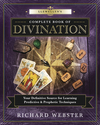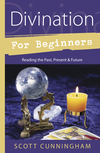The Spinning Basket Fortune Teller: Put Your Little Treasures to Work

Over time, many of us acquire an assortment of small but delightful trinkets, such as miniature animals or other little figurines, souvenir items, toys, miniature charms, and many other gewgaws. Along with these, we may also collect natural objects such as seeds and nuts, pebbles, and shells, as well as interesting bits of beach glass or driftwood and other found articles. Oftentimes these things give us pleasure because, aside from being colorful or whimsical, they convey some special symbolism or serve as mementos. Objects that people like to handle, carry around, or play with are often called "fetishes," from a Portuguese word that means something made by hand, but which, in popular usage, has come to mean things that attract us because they seem to be invested with a certain spirit. If you have an array of little treasures, you may carry some of them as lucky pocket pieces or display them in some decorative arrangement, such as a shadow box. However, if you've just been allowing them to accumulate in a junk drawer, you can take them to a new level of use, since fetishes have a traditional role in divination.
Many different forms of divination involve tossing small, symbolic objects onto a tray or other defined area, and finding meaning in the patterns they make. In the Ifa divination system of the Yoruba, cowries are cast into a large, carved, wooden tray, but sometimes seeds, nuts, and tiny figurines are also included. In Caribbean derivations of Ifa, some practitioners encircle the divination space with beaded necklaces, and they may also include fetishes in their throws. In Siberian tribal practices, some shamans place tokens onto a broad, flat drum, whose surface is divided into zones that make up a cosmogram (a map of their symbolic universe) and which may also be decorated with special symbols. They then tap the drum so that the fetishes hop around a bit, and divine by contemplating which segments of the drum the objects end up in, and which symbols they are adjacent to. Some gypsies have a variation of this, using a tambourine; they may use small shells or the dove-shaped pieces that fall out when you break open a sand dollar as their tokens.
For my own practice, I use a large, flat, 16-1/2-inch wide basket, which I place atop a lazy-Suzan type turntable, so that I can spin the basket. Before I acquired the turntable, I was usually able to spin the basket anyway, if I had a smooth table to set it on, but this makes it easier. I also have an 11-inch wide acacia wood bowl to contain my collection of fetish objects, along with runes painted on beach glass (called "mermaids's tears" in New England) and polished gemstones. I do not put sand in the bottom of my basket and then draw lines to mark the different zones, the way the Ifa diviners do with their wooden trays; although that has certain advantages, in my situation, that would create problems with sand leakage, and with the transportation of my assemblage. In choosing objects to include in my bowl, I exclude things that could be breakable, and I try to avoid anything over two inches long, because if items are too large, they're out of harmony with the rest of the collection.
To perform the divination, I place the basket before me, and the bowl alongside it. I may state a specific question or request, though as I have found that this type of divination is best for a general overview, I may simply say, "Please show me how my life is coming along at this time." Then, I spin the basket with my right hand, while reaching three times into the bowl to grasp a handful of objects with my left hand (because the left is the side that draws from the Unconscious), and gently toss them into the spinning basket. When demonstrating this for other people, I let them do the throws, while I stand holding the bowl a little bit behind them and to the left, so that they have to reach backward to take the articles from the bowl. Spinning the basket and reaching backwards into the bowl at the same time is a bit difficult and awkward, but that division of concentration makes you more open to the powers of the Unconscious. By spinning the basket (instead of just letting it sit), you bring in the element of motion, which is a magical force, and you also assure that your throws are more randomly distributed. That way, if all of the objects clump together in a certain part of the basket, you know it is because you have some issues are that are concentrated in that zone of meaning, and it is not just your habit of throwing. The spinning basket is allowed to come to rest after the last throw, and then you take note of its orientation, determining which edge of the basket is to the north, east, etc.
For purposes of interpretation, things that land in the center of the basket denote issues with which you are more self-identified. If the center is empty, that doesn't mean you have an ill-defined sense of self, but that more peripheral issues may be commanding your attention at this time. The meaning I attribute to the zones that we might liken to the north, east, south, and west quarters of the compass is somewhat reminiscent of the Celtic Cross spread in Tarot. Objects that fall to the right of center, in the "east," point to things coming up in your future; below, to the south, is the zone for issues that are a bit below consciousness, including childhood influences and other personal motivations; to the rear (west) are experiences from the recent past whose influences are still being felt; and the uppermost zone (north) designates conscious objectives. Again, if a certain zone remains empty—for example, the area of the future—that doesn't mean that you have no future, it just means that other concerns are more present for you. The cross quarters are transition zones. Articles that fall above the west-to-east axis are more above the surface, while those below that line are more in the realm of the unconscious. Things that land in front of the north-south axis are in a more developing state, so there is more that you can do to change them. However, even the past can be changed, by altering the interpretation you put on past events (such as highlighting the positive things you got out of them). When an object lands upside down, the qualities it represents are there for you, but you may have to work harder to realize them. You can also gain information based on which items are close together or touching each other.
If you are into astrology, you could divide the basket or other divination space into twelve areas corresponding to the houses of the Zodiac. Really, anyone could divide any divination space into different zones of meaning, according to their own concepts of Time, Cosmos, or the organization of life.
Because the Spinning Basket Divination is so much fun, the people for whom I demonstrate it often become enthusiastic as they start talking about raiding their button jars, jewelry boxes, junk drawers, kids' doll houses, etc., to pull together their own kits. The meanings I assign to different trinkets are based on traditional symbolism, or their association with personal experiences. Naturally, different people will attach different meanings to their little treasures, and everyone will have a different assortment. However, to give you a general idea of how to apply the symbolism, here is a partial list of what I have put together. These are just examples of how these things could be used, and you have to think about what each article in your own collection means to you.
MISCELLANEOUS MINIATURES:
- Arrowhead: taking aim
- Baby doll: something in its infancy
- Bobber: staying afloat
- Button with Athenian owl: you are being goddess-watched
- Car: getting around
- Coffee pot: group energy and harmony
- Cupid Smurf: love coming your way
- Die: chance; the number of dots may pertain to the matter in question
- Elephant: opens the way
- Fragment of foam space shuttle tile: are you well insulated?
- Frog: moisture in your life
- House from Monopoly game: a little house
- Marble: selfhood and the inner child
- Mardi Gras mask: trickster spirit
- Matrushka (nesting doll, the smallest in the set): generations
- Purple plastic sun: cheap pleasures
- Scarab: self-starting creativity and luck
- Shark: to swim fearlessly in the ocean of life (or the sharks are circling)
- Squirrel: purposeful activity (or gossip)
- Snail: it will take time
- Telephone: communications
- Thimble: hard work
- Tile fragment from the space shuttle: are you well insulated?
- Tropical fish: a good catch
- Woven basket: open to good things
NATURAL OBJECTS:
- Agate: Mercurial stone for making connections
- Aventurine: lucky accident
- Black stone: impenetrable matter
- Cone shell: the dangerous feminine
- Cowry: physical body issues, (cowries have been used to represent the eye, mouth, vulva, womb, and pregnant body)
- Crystal points: help from spiritual sources
- Driftwood: you're drifting, but you're resilient
- Holed stone: lucky openings
- Jasper: grounded energies
- Malachite: mental healing
- Petosky stone: the eyes of the past
- Pudding stone: the matrix of many possibilities
- Quartzite: the common thing
- Smoky quartz: you begin to see into a murky situation
A few of my doodads are ritually interactive, such as a bell (a call to attention) that you can ring to make a wish, and a souvenir salt container from Salzburg, from which you can shake out a pinch of salt to throw over your shoulder to avert bad luck.
When an object has a story behind it, it's also a good conversation piece, as is the case of an antique marble from Needles, California, given to me by my brother (who has the unique psychic power of being able to find lost toys in the desert), or a particular agate, which I regard as a gift from the witch that Witch's Island (on an Indian reservation in Canada) was named after, and therefore represents the spirit of the medicine woman.
Because the patterns of any divination represent a certain dream of reality, if there are some things you don't like in your reading, you can take the shamanic approach of changing your dream of reality. After acknowledging any potential problems that you might have to deal with and thinking about how you might deal with them, you can then alter the pattern by moving or exchanging objects. Upside-down items can be turned over, things can be moved to different quadrants, objects that denote things you don't want can be put back in the bowl, and things you'd like to manifest in your life can be plucked out of the bowl and placed wherever you like in the basket. Also, because other people have a hand in constructing our reality, after each person's reading is done when I demonstrate this technique for a group of friends, I invite his or her buddies to help add some luck and other good things to the design by picking additional items out of bowl and placing them in the basket as they explain why they choose to contribute those particular blessings. The final arrangement is quite a colorful work of art.
About Janina Renée
Related Products


is subject to certain Terms and Conditions